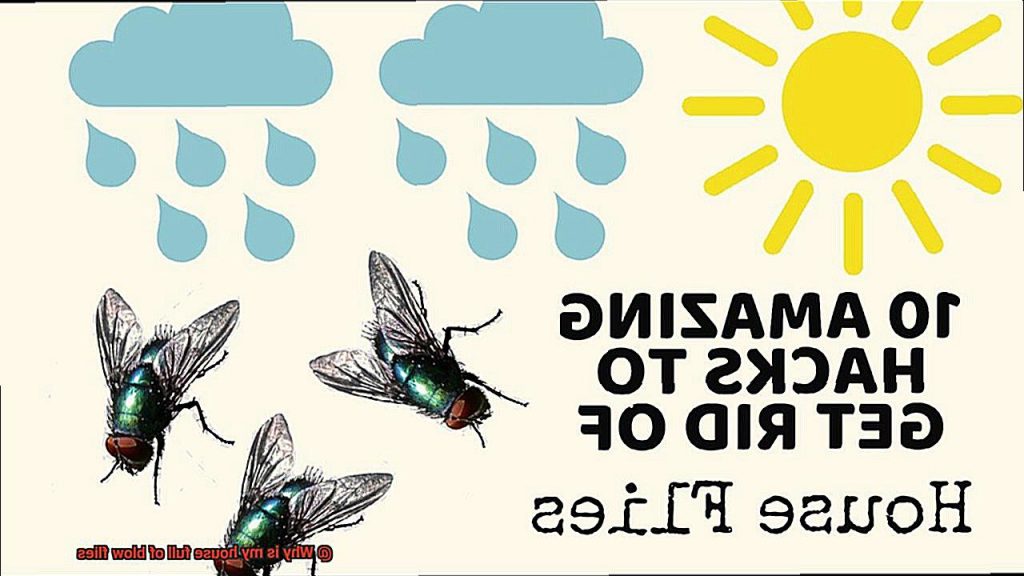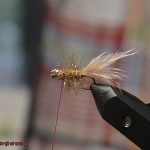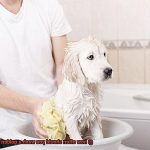Have you ever walked into your home only to be greeted by a swarm of buzzing, pesky flies? Not just any flies, but those larger, metallic blue or green ones that seem to be multiplying before your very eyes? If so, chances are you have an infestation of blow flies on your hands. While these insects may seem harmless at first glance, they can actually indicate a much larger problem lurking in your home.
In this informative blog post, we’ll take a deep dive into the reasons why your house might be full of blow flies. From underlying health issues to food sources and proper waste management practices, we’ll cover everything you need to know about these unwelcome visitors.
Firstly, let’s explore the life cycle of blow flies – understanding their habits is key to preventing their infestation. We’ll then move on to the various reasons why your home might be attractive to them. Perhaps there’s a dead animal hiding in your walls or excessive garbage and debris littering your property.
But don’t panic just yet. We’ll also provide you with some practical tips and tricks to help eliminate and prevent blow flies from invading your home again. By the end of this post, you’ll be equipped with all the knowledge and tools necessary to keep these pesky pests at bay for good.
So buckle up and get ready for an engaging read that will leave you feeling informed and empowered. Let’s dive in together.
What Are Blow Flies?
Contents
Blow flies, also known as bottle flies or greenbottles, are much more than just common pests. These metallic green or blue-bodied insects are often found in households, attracted to decaying organic matter such as animal carcasses and rotting food. With a wingspan of up to 3 centimeters, they are relatively larger than other house flies and emit a distinctive buzzing noise when they fly.
But what’s truly fascinating about blow flies is their role in forensic science. Their predictable life cycle has been used by scientists to estimate the time of death in homicide cases. The stage of blow fly development found on a body can help determine how long it has been dead. This makes blow flies an important tool in solving crimes and bringing justice to victims.
While these buzzing insects may be bothersome in the home, they play an essential role in nature by breaking down and decomposing organic matter. Their presence helps keep ecosystems healthy and balanced. However, if you’re dealing with a blow fly infestation, don’t fret. You can take steps to eliminate them from your home.
Firstly, identify the source of the problem. Do you have decaying food or garbage in your house? Is there a dead animal nearby? Addressing the root cause is the key to getting rid of blow flies for good. Dispose of any garbage or decaying matter promptly, and consider using fly traps or insecticides to eliminate any remaining blow flies.
Fix any plumbing issues and ensure that pet waste is properly disposed of. By taking these steps, you can prevent future infestations and coexist with these fascinating creatures peacefully.
Common Causes of Blow Flies in the Home
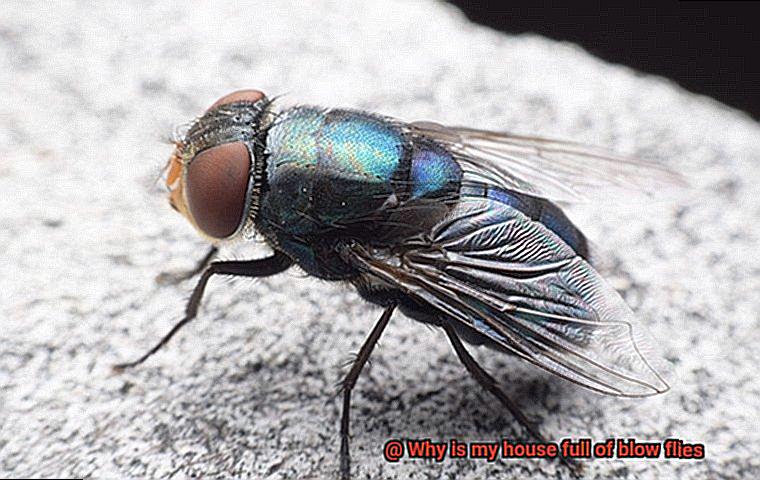
Blow flies are fascinating insects that can be found in homes, especially during the warmer months. These shimmering creatures are attracted to decaying organic matter, such as animal carcasses, garbage, and feces. It’s important to identify the source of the problem and swiftly dispose of any decaying matter to eliminate blow flies from your home and prevent future infestations. In this blog, we’ll explore the common causes of blow flies in the home and how to address them.
One of the most common causes of blow flies in the home is garbage. Improper disposal of garbage can attract these pests, so be sure to use a covered trash can and dispose of garbage regularly. Dead animals like rodents or birds can also attract blow flies, so if you find one in or around your home, it’s crucial to remove it immediately.
Pet waste is another common cause of blow flies in the home. Clean up after your pets regularly and dispose of their waste properly to prevent attracting these insects. Leftover food that has gone bad can also be a culprit, so clean out your refrigerator regularly and dispose of any expired food.
Moisture is another key factor that can attract blow flies. Be sure to fix any leaks or standing water in your home to eliminate this issue. Leaving windows and doors open can also allow blow flies to enter your home, so keep them closed or use screens to keep them out.
By addressing these common causes, you can help prevent blow flies from infesting your home. Remember to dispose of garbage regularly, remove any dead animals promptly, clean up pet waste, dispose of expired food, fix any moisture issues, and keep doors and windows closed or screened.
Signs of a Blow Fly Infestation
If they have a metallic green, blue, or black coloration, you may be dealing with a blow fly infestation. These insects are attracted to decaying organic matter and can quickly take over your home if left unchecked. But how can you recognize the signs of a blow fly infestation?
The most obvious sign is the presence of adult blow flies around your home. These flies are typically about 1/4 inch long and have a distinct coloring. They love to hang out near garbage cans, animal waste, or dead animals. If you see them buzzing around your house, it’s time to take action.
Another sign of a blow fly infestation is the presence of their eggs or larvae. Blow fly eggs are usually laid in batches of 100-200 and can be found on or near decaying organic matter. The eggs hatch into maggots, which are white or yellowish in color and can grow up to 1/2 inch in length. If you notice maggots in your home, it’s important to act quickly to eliminate them before they mature into adult flies.
A strong, unpleasant odor in your home can also be a telltale sign of a blow fly infestation. As these flies are attracted to decaying organic matter, the smell of decomposition can become overwhelming if left unchecked. Be sure to investigate the source of the odor and remove any decaying matter promptly to prevent further infestations.
If you have pets, you may notice that they are more agitated than usual if there is a blow fly infestation in your home. Blow flies can lay their eggs on or near your pets, which can cause irritation or infection if left untreated. Keep an eye on your pets and seek veterinary care if necessary.
Prevention Tips for Keeping Blow Flies Away from Your Home
If so, I’m here to help. As an expert on prevention tips for keeping blow flies away from your home, I have gathered some fascinating insights for you. Here are five sub-sections that detail effective prevention tips to keep blow flies at bay.
Keep Your Trash Cans Tightly Closed
Blow flies are attracted to garbage, so it’s essential to keep your trash cans tightly closed. Ensure that the lids are secure and clean the trash can regularly to avoid any buildup of decaying matter. By doing this, you can create an unattractive environment for blow flies and prevent them from infesting your home.
Dispose of Food Waste Properly
Blow flies are also attracted to food waste, so it’s crucial to dispose of it properly. Avoid leaving food waste out in the open for extended periods and dispose of it in airtight containers or in the garbage bin. By doing so, you can eliminate any potential food sources for blow flies and reduce their attraction to your home.
Clean Up Pet Waste Promptly
If you have pets, make sure to clean up after them promptly. Blow flies are attracted to pet waste, so use a pooper scooper or plastic bag to pick up the waste and dispose of it properly. By doing this, you can prevent the buildup of organic matter that may attract blow flies and keep them away from your home.
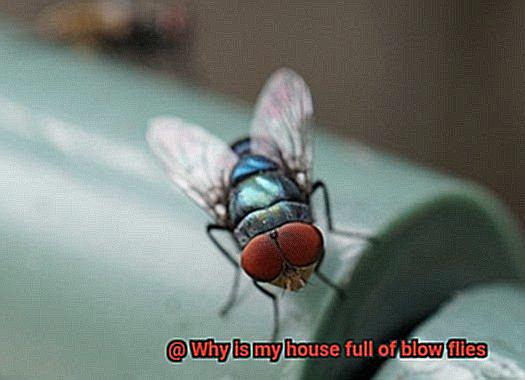
Keep Your Yard Clean
Regularly mow your lawn, trim bushes and trees, and remove any debris from your yard. This will help keep your yard clean and tidy, preventing any potential buildup of organic matter that may attract blow flies. By doing this, you can create an unattractive environment for blow flies and prevent them from infesting your home.
Seal Any Cracks or Gaps in Your Home
Blow flies can enter through small cracks or gaps in doors, windows, or walls. Ensure that all gaps and cracks are sealed with caulk or weather stripping to prevent them from entering your home. By doing this, you can eliminate any potential entry points for blow flies and keep them away from your home.
Natural Solutions to Get Rid of Blow Flies
As the temperatures rise, so does the prevalence of blow flies in homes. These insects are attracted to decaying organic matter, such as garbage, animal feces, and dead animals. However, you can use natural solutions to get rid of blow flies and keep them from ruining your summer season.
The first step is to maintain a clean home by disposing of garbage properly and cleaning up any food spills or crumbs. Eliminating potential food sources will help prevent blow flies from infiltrating your space.
Vinegar is a powerful natural insect repellent that can also be used to get rid of blow flies. Mix vinegar and water in a spray bottle and target areas where these pests are commonly found. The acidic aroma of vinegar will not only deter blow flies but also freshen up your living space.
In addition to vinegar, essential oils such as peppermint, lavender, and eucalyptus are also excellent natural insect repellents. These pleasant-smelling oils can be mixed with water and sprayed around your home to keep blow flies at bay.
Fly traps are another effective way to get rid of blow flies naturally. Make your own fly trap by filling a jar with a mixture of vinegar, sugar, and dish soap. The sweet scent of vinegar and sugar will attract the flies, while the dish soap will trap them inside the jar.
Finally, diatomaceous earth is a natural powder that can eradicate blow flies from your home. Sprinkle it around areas where blow flies are commonly found, such as windowsills or doorways.
Professional Solutions for Eliminating Blow Flies
Look no further, as there are several professional solutions available to eliminate these pesky insects.
One of the most effective methods is to use insecticides that are formulated specifically to target blow flies. These potent products come in spray form and can be directly applied to areas where the flies congregate, effectively eliminating them.
Another option is fly traps, designed to attract and trap blow flies using bait. These traps can be strategically placed around your house, near windows or doors, to catch the flies before they enter your living space.
For more severe infestations, calling in a professional exterminator may be necessary. These experts have the tools and expertise required to identify the source of the infestation and eliminate it quickly and effectively.
In addition to these professional solutions, there are several measures you can take on your own to prevent blow flies from entering your home in the first place. Keeping your house clean and free of food debris, sealing any gaps or cracks in windows and doors, and using screens on all entry points can help prevent blow flies from entering and breeding in your home.
Conclusion
In conclusion, don’t underestimate the power of these tiny pests. Blow flies can be a sign of a larger problem in your home and require immediate attention. Identifying the source of their infestation is key to preventing future outbreaks. Common culprits include garbage, decaying food or animal carcasses, pet waste, moisture, and open windows or doors.
If you’re noticing adult flies buzzing around your home, eggs or larvae in unexpected places, an unpleasant odor, or agitated pets, it’s time to take action. To prevent blow flies from invading your space, ensure that your trash cans are tightly closed and dispose of food waste properly. Promptly clean up any pet waste and keep your yard tidy. Seal any cracks or gaps in your home to prevent them from entering.
While natural solutions such as vinegar, essential oils, fly traps, and diatomaceous earth can be effective in getting rid of blow flies, severe infestations may require professional solutions such as insecticides or calling in an exterminator.

